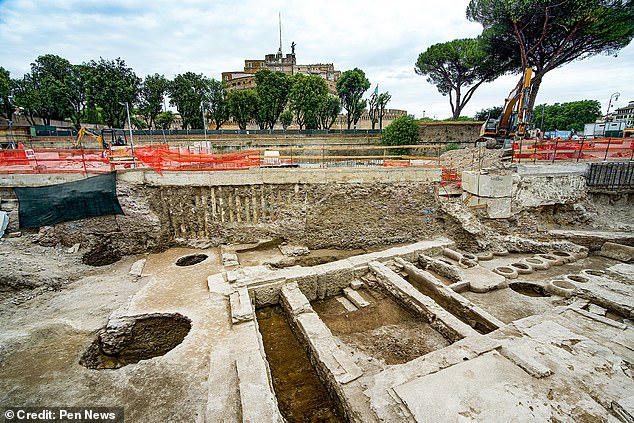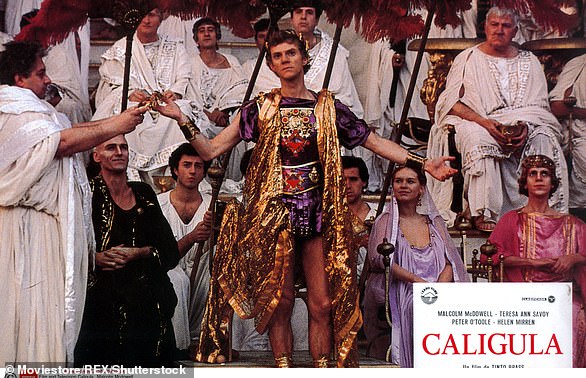The sumptuous terrace where ancient Rome’s most depraved emperor scorned his people as he begged for help has been unearthed in the path of a new underground passage.
Despite reigning for only four years, Caligula is remembered as perhaps the most cruel, insane, perverted, extravagant and murderous of the Roman emperors.
His reign was also marked by a tense relationship with the empire’s Jews; during his reign the first anti-Semitic pogrom in history took place in Alexandria, Egypt.
Now, the very spot where a delegation of Alexandrian Jews appealed to Caligula for help has been discovered on the banks of Rome’s Tiber River during excavations for a new underground passage.
Daniela Porro, the special superintendent of Rome who led the excavation, had no doubt that this was where the fateful (and ultimately futile) encounter took place.
The sumptuous terrace where ancient Rome’s most depraved emperor scorned his people as he begged for help has been unearthed in the path of a new underground passage.
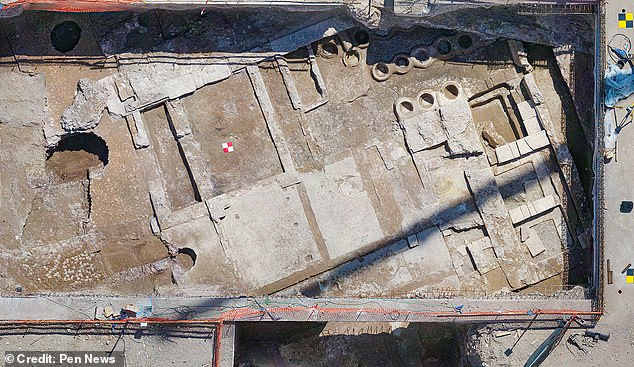
The very spot where a delegation of Alexandrian Jews appealed to Caligula for help has been discovered on the banks of Rome’s Tiber River during excavations for a new underground passage.
“It’s obviously that place,” he said.
‘We were lucky enough to find on one of the walls a fistula – a water pipe – with the name of Caligula printed on it, meaning that the portico was built by him.’
The discovery consists of a brick and travertine marble wall that once formed a terrace over the Tiber River, with the foundations of a columned portico behind it.
There is also a large open area believed to have been the ancient Horti Agrippina, i.e. Gardens of Agrippina, named after Caligula’s mother.
The portico’s pipe is named after Gaius Caesar Augustus Germanicus.
This was the emperor’s real name (Caligula was a nickname given to him when he was a child and wore a mock soldier’s outfit, complete with little boots or “caligae”).
The site also matches a description given by a member of the Jewish delegation, Philo of Alexandria.
In his work Legatio ad Gaium, meaning The Embassy to Gaius, he describes Caligula “receiving us favourably at first, on the plains by the Tiber (for he happened to be walking in his mother’s garden).”
Porro said the find was surprising even to Rome’s pampered archaeologists.

The discovery includes a brick and travertine marble wall that once formed a terrace over the River Tiber, with the foundations of a columned portico behind it.
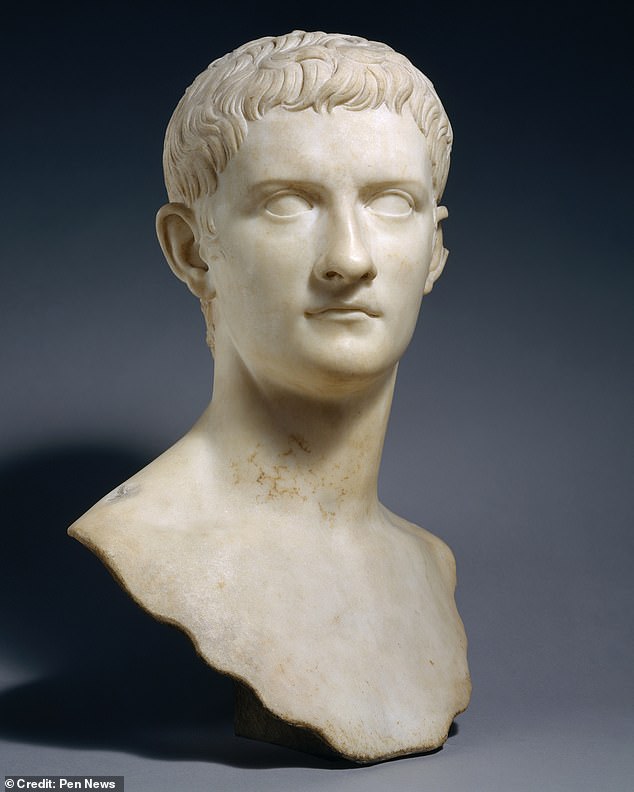
Despite reigning for only four years, Caligula is remembered as perhaps the most cruel, insane, perverted, extravagant and murderous of the Roman emperors.
She said: ‘Every time there are excavations in Rome it is easy to find archaeological finds.
‘In this particular case we knew that this was the area where the Horti of Agrippina and Domitia were located.
‘They were wonderful imperial gardens with pavilions, porticos and buildings for leisure.
‘So we imagined we would find something, but we did not expect to find the foundations of Caligula’s portico.’
The Alexandria pogrom broke out at a time of growing tension between the city’s Jewish and Greek populations.
Because of their monotheistic faith, the Jews could not comply with Caligula’s orders to be worshipped as a living god.
Under this pretext, Aulus Avilius Flaccus, the Roman governor of Egypt, had the Jews of the city arrested and forced to live in a ghetto.
Philo described the horrors that followed, saying that their enemies “slew them and thousands of others with all kinds of agonies and tortures, and newly invented cruelties.”
“The most ruthless,” he said, “burned entire families, husbands with their wives and small children with their parents, in the middle of the city.”
In his recollections, the historian describes the first meeting with Caligula on the Tiber as superficially positive.
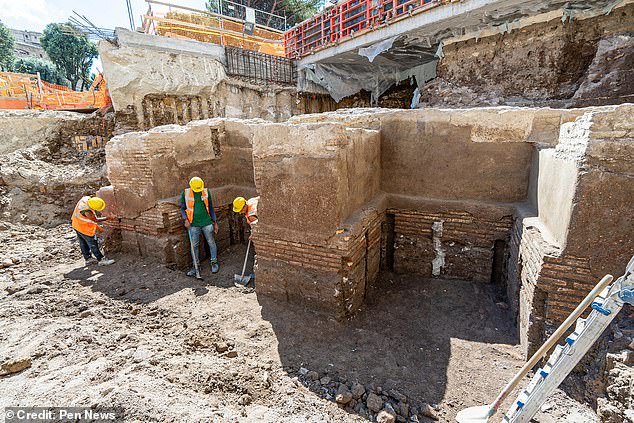
The site matches a description given by a member of the Jewish delegation, Philo of Alexandria.
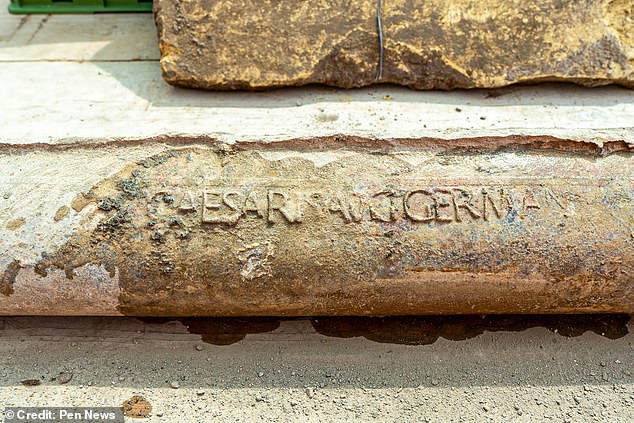
The pipe in the portico is named after Gaius Caesar Augustus Germanicus. This was the emperor’s real name, as Caligula was a nickname given to him when he was a child and dressed in a mock soldier’s outfit, with little boots or “caligae”.
He says that the Emperor “spoke with us formally and made a gesture of protection with his right hand, giving us important signs of his good will.”
He continued: “Everyone around us congratulated us as if we had already achieved our goal, and so did our own people.”
However, Philo was not fooled, and his cynicism was well founded.
During a second meeting at Caligula’s palace, Philo discovered that “they had not been brought before a judge, but before an accuser,” an “implacable tyrant, displaying uncontrolled authority, displeasure, and pride.”
The emperor said to them: “You are enemies of God, since you do not believe that I am a god, whom all other nations already recognize as a god, but whom you deny that appellation.”
The most scandalous thing is that Caligula wanted to install a statue of himself as Jupiter in the Second Temple of Jerusalem, the most sacred place in Judaism.
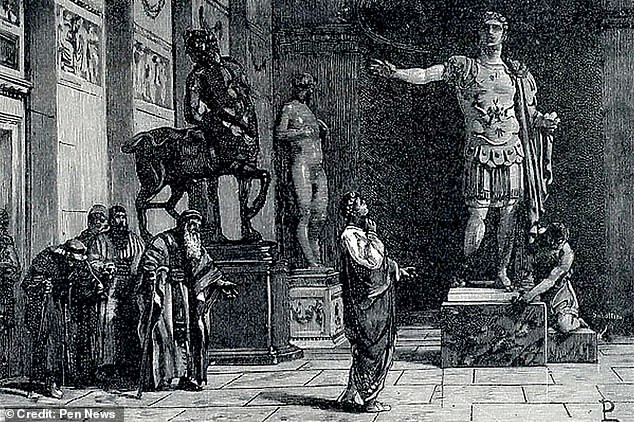
Most scandalously, Caligula wanted a statue of himself as Jupiter to be installed in the Second Temple in Jerusalem, the holiest place in Judaism.
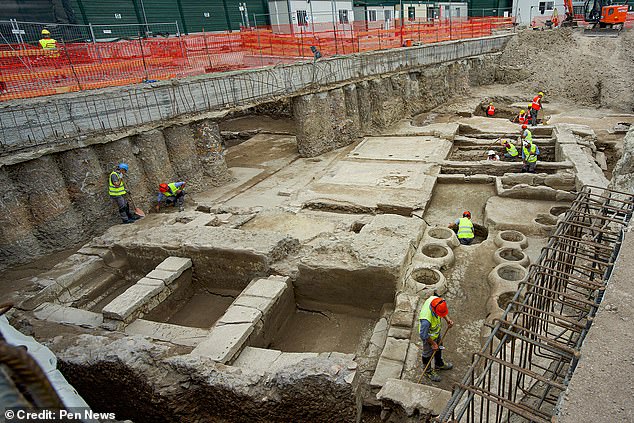
“It is clear that this is the place,” says Daniela Porro. “We were lucky enough to find a fistula – a water pipe – on one of the walls with the name Caligula printed on it, which means that the portico was built by him.”
Governor Publius Petronius, fearing a Jewish rebellion, was able to postpone the order until the assassination of Caligula in AD 41.
After Caligula’s death, the Horti of Agrippina would eventually be inherited by his nephew, Nero, the last of the Julio-Claudian dynasty.
Porro said: ‘He decided to build his own theatre not far from the Portico of Caligula, whose remains we discovered last year.’
‘During the subsequent Flavian dynasty, the portico and other buildings of the Gardens of Agrippina were destroyed or reused for other purposes.
‘In fact, on the foundations of the portico of Caligula we find a fullonica, or washhouse.’
He added that the finds will be dismantled, with a view to potentially displaying them in an open-air museum.
The excavation was coordinated in the field by archaeologist Dora Cirone, with scientific direction by Alessio De Cristofaro.

